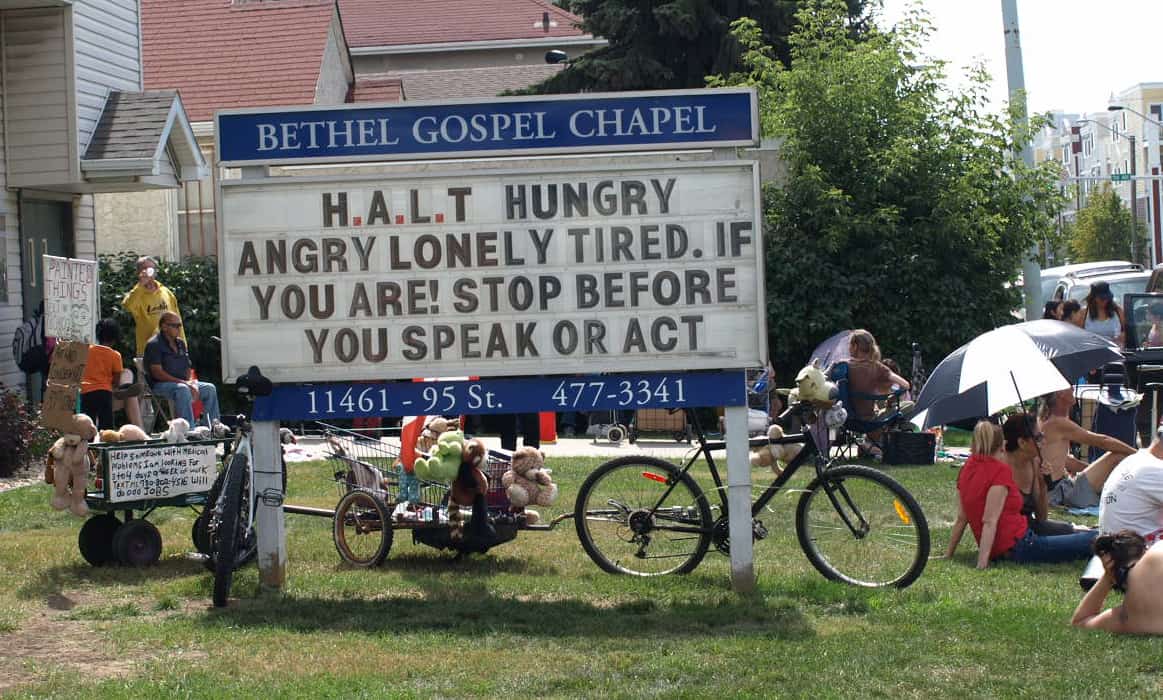Love, fear, and the pandemic
Living in the inner city, my wife Patricia and I see our share of peculiar occurrences. We chose to live here in large part because it keeps life real. Drug use and sex trafficking and “bicycle recycling” are all part of the tapestry. Homelessness and panhandling are everyday reminders of social inequities. We don’t have the option of looking the other way and pretending that these realities don’t exist.
Until recently, we have not been easily put off by this street-level lifestyle. But the pandemic has changed all this. Social services have diminished and needs have increased. Tent cities are multiplying and drug use is proliferating. And, equally surprising and disturbing, my sympathies toward such situations are changing.
About a month ago, I went out back to move my car. Fortunately, I checked first. A 30-something fellow, chest bare, was lying in the lane, his head under the vehicle parked behind me. He had a wrench in one hand and a crack pipe in the other. I called out to him but he didn’t respond. The only sign of life was his spasmodic twitching. I phoned 911 immediately. The operator asked me to roll him over onto his back to check to see if he was breathing. He was already lying on his back so I was able to answer yes from a distance. A few moments later, an ambulance arrived and the paramedics were instantly engaging respectfully with the gentleman and helping him into the ambulance.
What stayed with me long after was the striking contrast between my attitude and that of the paramedics. When the 911 operator asked me to roll the man over to check his breathing, I was revulsed by the thought. I was an inner city social worker for over 20 years (I just recently retired), and I was always ready to roll up my sleeves and help. Something has changed.
What is the difference? Blame COVID-19.

Over the past few years, the mindset has been drilled into all of us to see others as germ-carrying threats. I have certainly bought into this approach. Most of my family and friends have had COVID-19 and their experience has not been pleasant. Wearing a mask, getting vaccinations, and doing home checks have seemed to be minor inconveniences to avoid the virus. And we continue to take reasonable precautions to ensure that it stays that way.
What concerns me is that I have put fear ahead of love and have put hygiene precautions ahead of helping someone in desperate need. I could have quickly gone into the house and grabbed some gloves and a mask if that was my concern. But in truth, I didn’t want to go near the gentleman and get personally involved. The fear of germs repulsed me.
Society has changed. When I shared this story with others, everyone sympathized with my reaction and shared my surprise that the 911 operator would even suggest I get hands on. The preoccupation with the virus has led us to ignore or overlook other social concerns. We are much more calculating and circumspect about with whom we engage and how.
Here’s a service delivery example of how the pandemic has changed the way we treat people. In my last two years as a social worker, during heightened COVID-19 protocols, we were restricted from visiting our clients. Although this severely hampered our involvement with our clients, we accepted it as part of the presumed temporary battle against the virus. But then all the protocols were relaxed and we were still prohibited from visiting with our clients. The rationale: if social distancing was good enough for two years, it would be good enough for the future. This pattern was repeated throughout the social services where supports shut down during COVID-19 were not reinstated after the protocols were lifted. In the meantime, the rising numbers of people in distress without adequate resources are a testament to the fact that these supports are needed. People need people.
The time has come to do an attitude adjustment. We need to temper our dehumanizing fear with a good portion of humanizing love. We can’t let self-care preclude caring for others, whether in a moment of crisis or in day-to-day contact. We need to give and receive the gentle affirmation that comes from a hug or a hand held as much as the firm intervention for someone who has fallen off the curb and needs help righting themselves.







